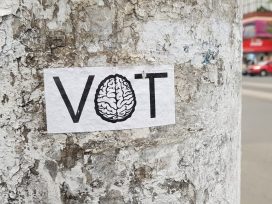Charlotte Knobloch: I am firmly of the conviction that Mein Kampf should never again be legal and it should not be made publically available, in any shape or form, in Germany or anywhere else in the world. [In Germany, it is currently legal to own existing copies.] It is one of the most offensive anti-semitic diatribes that has ever been written. It is a dangerous book that unleashed unspeakable devastation. This book formed the ideological basis that paved the way to the industrial operation that was the mass extermination of the European Jews: the Holocaust. It is a Pandora’s box: when you stir up this kind of hatred, no one knows where it might lead.
Sascha Feuchert: Obnoxious, repellent, abominable: there can be no doubt that Mein Kampf is one of the most hideous texts in the German language. Characterized by racial hatred and a relentless urge to crush all dissent, it is also driven by Hitler’s desire to provide his acolytes with a manual on how to seize power and consolidate it through brute force.
It is a normal, healthy reflex to want to delete this work once and for all from our cultural memory, so that it can never again spread its disturbing message. But when the copyright expires in Germany in 2015, 70 years after the dictator’s death, it makes sense and, indeed, is of utmost importance that a critical academic edition is readily available in its original language as source material. The Munich-based Institute for Contemporary History (Institut für Zeitgeschichte, IfZ) is currently working to produce such an edition, with the aim of publishing it in January 2016, although funding for the project has recently been withdrawn by the state of Bavaria, which holds the current copyright.
The discussion of whether German readers should be “allowed” access to the text is a farce. Even though it has been illegal to print and distribute the work in Germany since 1945, the book has been freely accessible online for years, both in German and in countless translations: a quick Google search brings up the required results. Follow the links, however, and you’ll find an unannotated edition, devoid of context, or, most likely, end up on a far-right website. A scholarly edition could offer a serious alternative – especially for younger readers – which contextualizes the content, deconstructs the stylized autobiography, reveals the many amendments made to the text up to the final edition in 1945, and documents Hitler’s countless false assertions. It would, of course, be essential that this scholarly edition is also freely available on the Internet and as easy to find as the many other versions of the work that do not offer all of this additional context. The academics in Munich have still not decided whether to publish an open-access version online or just a printed version. If they do not wish to undermine their own claim of wanting to educate readers, then this edition has to be published freely on the Internet.
CK: Of course, it is impossible to prevent people from finding the text on the Internet, but there is a considerable difference between the text being found only on controversial websites, which are relevant only to their intended audience, and the book once again being freely and widely stocked in bookstores and libraries across Germany. There are people who are considering publishing the book, or parts of it, for academic reasons, but others have commercial motivations. “Hitler sells” is the age-old axiom that has prompted countless tasteless artefacts in the past.
SF: Reading Mein Kampf helps you to “make sense of Hitler’s perspective on the world, his ideological roots, his contradictions and, ultimately, the consequences of his aims”, as historian Andreas Wirsching, director of the Institute for Contemporary History, puts it. If you really want to understand the Third Reich, then you have to go back to the sources, and there is no room here for taboos. The Bavarian government, to whom the copyright for Hitler’s writings was transferred by US occupation forces after the war, may have withdrawn from financing the project – mainly due to protest from Holocaust survivors in Israel – but they have not recalled the finances already allocated or made any other steps towards blocking the project. On the contrary, they have repeatedly assured the scholars at the Institute for Contemporary History that their academic freedom will not be affected.
There is, then, recognition on a political level of the benefits of making this source text available. And yet the state of Bavaria has also made a contrary statement to the effect that after expiry of the copyright, they would employ all legal means to prevent the dissemination of the book, if it were used to “incite racial hatred”. State ministers of justice across Germany have since aligned themselves with this position. It looks like politicians trying to do the splits. On the one hand, there’s the educational value that an academic edition can offer, and then there’s the well-intentioned goal of wanting to “protect” the public from the dissemination of the text and its inhumane ideas. Time will tell whether German judges will follow the approach taken by the politicians, who want to emphasize the principle that there is no place in Germany for contextfree, unscholarly editions; not every Tom, Dick and Harry should be able to publish their own version of Mein Kampf after the copyright expires. And meanwhile, absurdly enough, the Bavarian government has also said that even the IfZ edition would be vetted for its potential for incitement.
CK: No one who’s interested in German history is reliant on reading Mein Kampf. Far from it. There are already a number of historical editions. Research on the topic has been outstanding and is very widely published. Every year more and more material is added to the corpus. And that’s a good thing. We have certainly not completed the task of assessing the context and consequences of German history: there is still much to be done in terms of reappraising and exploring its many political, moral, economic, cultural, social and psychological dimensions. But Mein Kampf doesn’t bring us a single step further. To argue there’s a case for reading the text to understand the historic context is a rather spurious assertion and certainly not very constructive.
SF: There is an urgent need to demystify the book in Germany. There is no end to the legends and urban myths that spring up about the text, such as the much-repeated claim that while Mein Kampf had sold around 12 million copies by the end of the war, it was mostly an unread bestseller. A new edition could highlight longstanding evidence that the book enjoyed an extremely wide ownership from very early on and the readers should therefore have known full well about the planned extermination of the Jews and the designs Hitler had for dictatorship. Moreover, it is equally important that a new edition demonstrates something else that has recently been proven: the text itself does not have any intrinsic power to “infect” its readers. All of Hitler’s speeches have been available for some years now, with extensive commentary, in an edition produced by IfZ. In content and in rhetoric they do not differ much from Mein Kampf, and yet these texts have certainly not unleashed any kind of “political epidemic”. But Hitler’s first book is to this day viewed with fear. This fear is irrational, as a stand-up comedian in Germany has demonstrated. The Turkish-born performer Serdar Somuncu has, since 1996, given more than 1,400 public readings of Mein Kampf across Germany, particularly in schools, which have been attended by some 250,000 people. The readings reveal the internal contradictions and follies of the book in a humorous, and yet very meaningful, way.
CK: Hatred of people always has the power to infect others with hatred. As far as I’m concerned, the idea that the text needs demystifying only serves to add greater mystery and intrigue to it. I can see nothing of the kind in the text; it is a diatribe against Jews of the most revolting kind, which opened the floodgates for an ideology of mass destruction.
It is certainly not a violation of freedom of expression to prohibit the publication of Mein Kampf. On the contrary: the prevailing legal opinion on the matter says that publishing the original text is tantamount to the criminal act of incitement of racial hatred. There must be academic freedom to pursue research interests, and academic institutions will probably want to bring out an annotated version, even though I would personally prefer that they didn’t. But at least this will not be subsidized by the state of Bavaria. The State Government has decided that much.
This exchange of views was initiated by Index on Censorship and conducted by email in late summer 2014.






